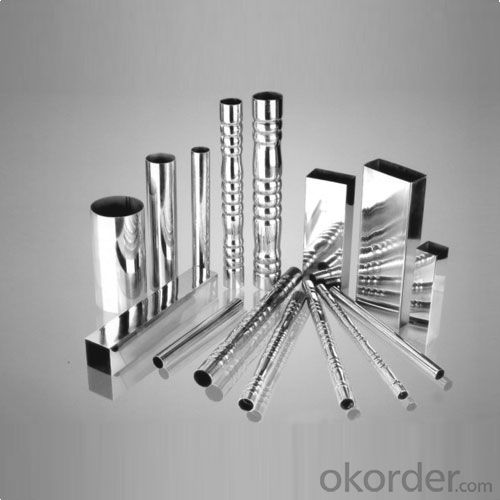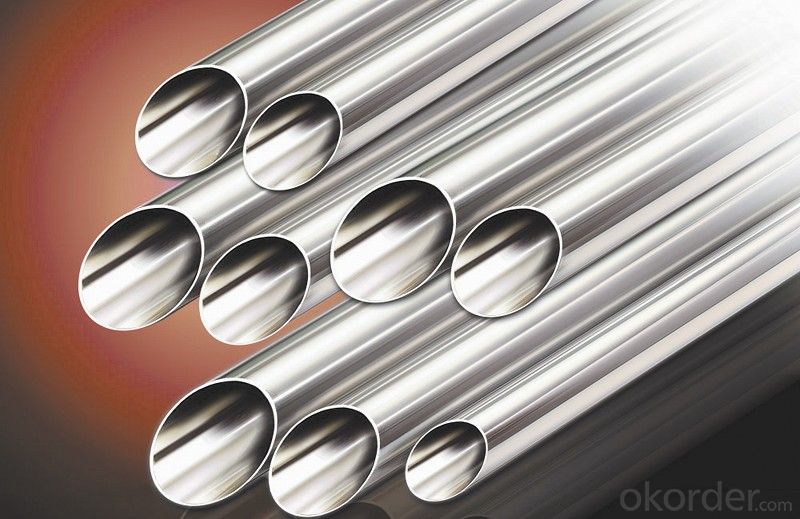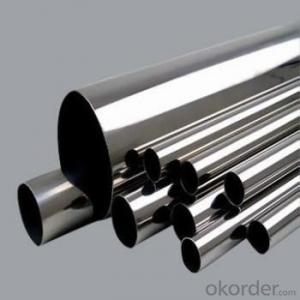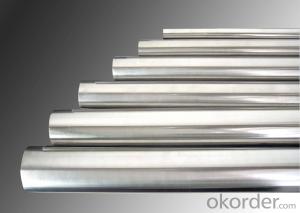Round Section Varnished Coated Seamless Carbon Steel Pipe For Oil&Gas Use
- Loading Port:
- Tianjin
- Payment Terms:
- TT OR LC
- Min Order Qty:
- 35 m.t.
- Supply Capability:
- 5000 m.t./month
OKorder Service Pledge
OKorder Financial Service
You Might Also Like
Item specifice
Structure :
Seamless pipe is formed by drawing a solid billet over a piercing rod to create the hollow shell. As the manufacturing process does not include any welding, seamless pipes are perceived to be stronger and more reliable. Historically seamless pipe was regarded as withstanding pressure better than other types, and was often more easily available than welded pipe.
Main Features :
• High manufacturing accuracy
• High strength
• Small inertia resistance
• Strong heat dissipation ability
• Good visual effect
• Reasonable price
FAQ :
A. How is the quality of your products?
Our products are manufactured strictly according to national and internaional standard, and we take a test on every pipe before delivered out. If you want see our quality certifications and all kinds of testing report, please just ask us for it.
Guaranteed: If products’ quality don’t accord to discription as we give or the promise before you place order, we promise 100% refund.
B. How about price?
Yes, we are factory and be able to give you lowest price below market one, and we have a policy that “ for saving time and absolutely honest business attitude, we quote as lowest as possible for any customer, and discount can be given according to quantity”,if you like bargain and factory price is not low enough as you think, just don’t waste your time.Please trust the quotation we would give you, it is professional one.
C.Why should you chose us?
Chose happens because of quality, then price, We can give you both.Additionally, we can also offer professional products inquiry, products knowledge train(for agents), smooth goods delivery, exellent customer solution proposals.Our service formula: good quality+good price+good service=customer’s trust
SGS test is available, customer inspection before shipping is welcome, third party inspection is no problem.
Any question, pls feel free to contact us !
Product image:


Company Information:
CNBM International Corporation (CNBM International) is the most important trading platform of CNBM Group Corporation, a state-owned company under the direct supervision of State-owned Assets Supervision and Administration Commission of the State Council.
Since 2004, the trading volume of CNBM International has been doubled in 5 successive years owing to the support of superior corporations and effort of all staff. Meanwhile, we have established strategic partnerships with hundreds of domestic manufacturers and sound business relations with clients from over 120 countries. Currently, we have wholly-owned overseas subsidiaries and branches in 5 countries with a view to realize localization, which also represents an essential progress in our globalization target.
In line with the business, CNBM International launched E-business platform Okorder.com.Our goal is to transform CNBM International into the global leading brand in building materials industry within 3 to 5 years through innovation and reform, by strengthening the overall management of supply chain, developing and cultivating both domestic and overseas market, improving the procedure and information system, enhancing the ability to organize resources and to provide value-added services under a professional team and a learning organization.
- Q:What are the different sizes of steel pipes available?
- Steel pipes are available in a wide range of sizes, ranging from small diameters of around 0.5 inches to large diameters of up to 72 inches or more. The specific sizes of steel pipes vary depending on their intended use and application, with common sizes falling within the range of 1/8 inch to 36 inches in diameter.
- Q:What are the advantages of using steel pipes in construction?
- There are several advantages of using steel pipes in construction. Firstly, steel pipes are incredibly strong and durable, providing excellent structural integrity and long-term reliability. They can withstand high pressure and heavy loads, making them suitable for various applications such as water and gas transportation, oil pipelines, and building frameworks. Secondly, steel pipes have a high resistance to corrosion, which ensures longevity and reduces maintenance costs. Additionally, steel pipes are versatile and can be easily customized to meet specific project requirements, as they come in various sizes, shapes, and thicknesses. Lastly, steel pipes are environmentally friendly, as they are recyclable, reducing the overall carbon footprint of construction projects.
- Q:How are steel pipes protected against rust?
- Steel pipes are protected against rust through a variety of methods. One common method is by applying a protective coating to the pipes. This can be done by using a layer of paint, epoxy, or a corrosion-resistant coating such as zinc or galvanized coatings. These coatings act as a barrier between the steel and moisture, preventing the formation of rust. Another method of protecting steel pipes against rust is by using cathodic protection. This involves the use of sacrificial anodes, typically made of zinc or magnesium, which are attached to the steel pipes. These anodes corrode instead of the steel, sacrificing themselves and preventing rust formation on the pipes. In addition to coatings and cathodic protection, steel pipes can also be protected against rust by using corrosion inhibitors. Corrosion inhibitors are chemicals that are added to the water or fluid flowing through the pipes. These chemicals form a protective film on the surface of the steel, inhibiting the corrosion process and preventing rust from forming. Regular maintenance and inspections are also crucial in protecting steel pipes against rust. Any signs of damage or wear on the protective coatings should be addressed promptly to prevent rust from developing. Additionally, ensuring that the pipes are properly cleaned and dried before applying any protective coatings can also help in enhancing their effectiveness. Overall, a combination of protective coatings, cathodic protection, corrosion inhibitors, and regular maintenance is employed to ensure that steel pipes are effectively protected against rust and corrosion, prolonging their lifespan and maintaining their structural integrity.
- Q:What is the difference between steel pipe and concrete pipe?
- Steel pipe and concrete pipe are both commonly used for various applications, but they differ significantly in their material composition and properties. Firstly, the main difference lies in the materials used to manufacture these pipes. Steel pipes are made from steel, which is an alloy of iron and carbon. On the other hand, concrete pipes are made from a mixture of cement, aggregate (such as sand or gravel), and water. Secondly, steel pipes are known for their strength and durability. They can withstand high pressure, making them suitable for applications that require transporting fluids or gases under high pressure. Steel pipes also have a high resistance to corrosion, which is advantageous in environments where the pipe is exposed to moisture or chemicals. In contrast, concrete pipes are not as strong as steel pipes and are more prone to cracking or damage under high pressure. However, they are still capable of handling moderate pressure loads and are often used for drainage systems or sewage applications. Another significant difference is the installation process. Steel pipes are typically joined together using welding techniques, such as butt welding or socket welding. This creates a seamless and strong connection between the pipes. On the other hand, concrete pipes are often installed using rubber or gasketed joints, which are easier to assemble and disassemble. Cost is another factor where steel and concrete pipes differ. Steel pipes tend to be more expensive due to the higher cost of steel as a raw material and the additional labor required for welding and fabrication. Concrete pipes, on the other hand, are generally more cost-effective as the materials used in their production are more readily available and the installation process is simpler. In summary, the main differences between steel pipes and concrete pipes lie in their material composition, strength, resistance to corrosion, installation process, and cost. Steel pipes offer superior strength and durability, making them suitable for high-pressure applications and environments prone to corrosion. Concrete pipes, while not as strong, are cost-effective and commonly used for drainage systems or sewage applications.
- Q:What is the difference between steel pipe and polyethylene pipe?
- The main difference between steel pipe and polyethylene pipe lies in their materials and properties. Steel pipe is made from a durable and strong material, which makes it suitable for high-pressure applications and environments where strength is crucial. On the other hand, polyethylene pipe is made from a plastic material that offers flexibility and resistance to corrosion, making it ideal for underground and aboveground installations. Additionally, steel pipe requires welding or threading for connections, while polyethylene pipe uses fusion or mechanical fittings. Ultimately, the choice between steel pipe and polyethylene pipe depends on the specific requirements of the project and the desired characteristics needed.
- Q:Can steel pipes be used for underground oil pipelines?
- Indeed, underground oil pipelines can utilize steel pipes. The construction of underground oil pipelines heavily relies on steel pipes owing to their robustness, longevity, and resistance to corrosion. They possess the capability to endure the immense pressure and weight exerted by the oil being transported, along with external forces like soil displacement or seismic events. Moreover, steel pipes can be fortified with coatings or linings such as epoxy or polyethylene, enhancing their resistance to corrosion and extending their lifespan. In conclusion, steel pipes emerge as a dependable and extensively employed option for underground oil pipelines.
- Q:What's the difference between straight steel pipe and seamless steel pipe?
- The welded pipe is made of rolled steel plates, and small ones are straight welded, and big ones are spiral welded. Because the welded pipe has weld, the mechanical performance of weld is poor, so its applicable range is limited, but its price is cheap. Significant difference is that there are welded pipe, seamless steel pipe is not, of course, the welded pipe treatment of good, layman do not see the difference.
- Q:Are steel pipes suitable for structural applications?
- Yes, steel pipes are suitable for structural applications due to their high strength, durability, and versatility. They are commonly used in various construction projects such as buildings, bridges, and infrastructure due to their ability to bear heavy loads, resist corrosion, and withstand extreme weather conditions.
- Q:Can steel pipes be used for oil well casing?
- Yes, steel pipes can be used for oil well casing. Steel pipes are commonly used for oil well casing due to their strength, durability, and ability to withstand high pressure and extreme environmental conditions.
- Q:What are the different types of steel pipe supports?
- There are several types of steel pipe supports, including pipe hangers, pipe clamps, pipe saddles, pipe brackets, and pipe supports with rollers.
1. Manufacturer Overview |
|
|---|---|
| Location | |
| Year Established | |
| Annual Output Value | |
| Main Markets | |
| Company Certifications | |
2. Manufacturer Certificates |
|
|---|---|
| a) Certification Name | |
| Range | |
| Reference | |
| Validity Period | |
3. Manufacturer Capability |
|
|---|---|
| a)Trade Capacity | |
| Nearest Port | |
| Export Percentage | |
| No.of Employees in Trade Department | |
| Language Spoken: | |
| b)Factory Information | |
| Factory Size: | |
| No. of Production Lines | |
| Contract Manufacturing | |
| Product Price Range | |
Send your message to us
Round Section Varnished Coated Seamless Carbon Steel Pipe For Oil&Gas Use
- Loading Port:
- Tianjin
- Payment Terms:
- TT OR LC
- Min Order Qty:
- 35 m.t.
- Supply Capability:
- 5000 m.t./month
OKorder Service Pledge
OKorder Financial Service
Similar products
New products
Hot products
Related keywords




























